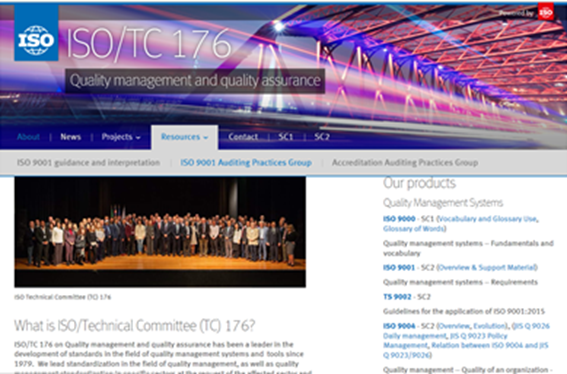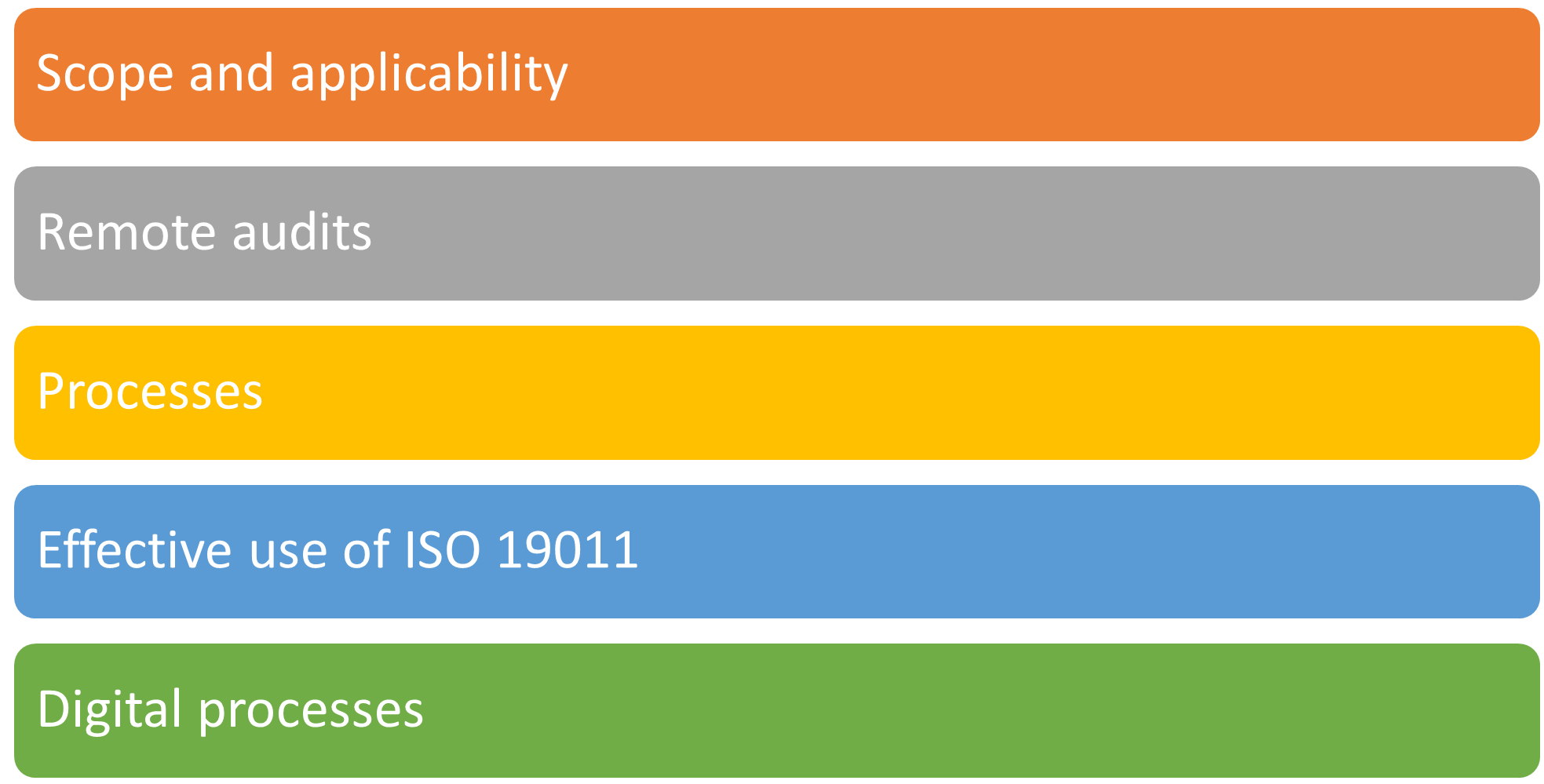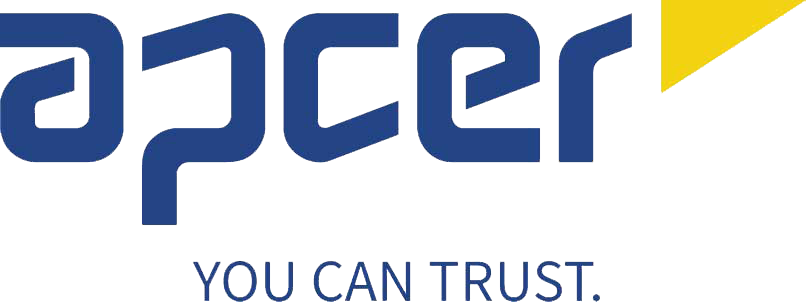Introduction
The ISO 9001 Auditing Practices Group (ISO 9001 APG) is a working group of ISO Technical Committee 176: Quality Management and Quality Assurance. Its aim is to spread knowledge and best practice in auditing the requirements of ISO 9001, the reference standard for Quality Management Systems.
The group was created just after the publication of ISO 9001:2000, and its first papers were essential in demonstrating how to conduct process-based audits instead of the traditional and unproductive requirements-based audits. Shortly afterwards, the Accreditation Auditing Practices Group (AAPG) was created, followed more recently by the ISO 14001 APG.
In this article, we explain more about the group, how it operates, and how it cooperates with other groups. We talk about the latest publications, as well as those to come. And finally, we invite you to interact with ISO 9001 APG.
About the Group
The ISO 9001 Auditing Practices Group is an informal group of quality management system (QMS) experts, auditors and practitioners drawn from ISO Technical Committee 176: Quality Management and Quality Assurance (ISO/TC 176) and the International Accreditation Forum (IAF). It has two co-conveners, one for ISO/TC 176 and the other for the IAF, who jointly coordinate the work of the ISO 9001 APG and the AAPG.
The group aims, through the contributions of its members, to provide QMS auditors with practical guidance, examples and technical knowledge to help them conduct their audits. Its papers may be suggested by members with a view to sharing knowledge on specific subjects, or be prompted when a need emerges to clarify a given aspect of auditing practices.
Aimed at third-party auditors (certification auditors), they could also prove interesting reading for other interested parties such as internal auditors and second-party auditors (supplier audits), auditors from accreditation bodies, quality managers, audit programme managers, and consultants, as well as other quality, management-system and audit professionals.
The group's work results in recommendations and examples of auditing practices, focusing on a process-based approach and risk-based thinking. These are available to the public in the form of papers on the ISO website (click here).
The information provided does not undergo a consensus process and is not officially endorsed by the IAF or the ISO as a formal interpretation, benchmark, or the preferred way of performing ISO 9001 audits. However, since the writers are third-party auditors from all regions of the world, with significant experience in ISO 9001 audits, the group's guidance is highly regarded and is often used and referenced in training materials for various auditor training programmes.
The experts are appointed by the ISO/TC 176, its subcommittees, the IAF and ISO/CASCO based on their CVs, auditing experience and availability to actively contribute their knowledge and expertise to the group's work.
How papers are written
Any group member can propose a topic by submitting a text. They may suggest a new paper or a revision or update of an existing text. A small editorial committee is appointed to review the text and give its input. The text is then made available internally to seek feedback from the entire task force, before being published on the website. The aim is to have a fast and agile publication process that brings together a range of different contributions on the same topic and enables all members to have their say prior to publication if they so wish, but without long delays.
The approval process does not require a formal vote by the members of the IAF or ISO/TC 176, and so does not have their formal endorsement. No paper can be considered definitive, as each reflects a range of different perspectives based on the practical experience of the writers. As such, the papers are not always consistent, and may not be generally applicable outside of the specific context in which they were written.
Internal approval takes place by consensus. Any questions raised by any member of the IAF or TC 176 are analysed by the group and duly dealt with.
Traditionally, the group meets in person at the plenary meetings of ISO/TC 176 and annually at one of the IAF's biannual meetings. More recently, it has been meeting virtually on a regular basis.
The website

Figure 1 – ISO/TC 176 website
The 42 papers are grouped into three topic areas, which we present briefly in Table 1. They can be downloaded individually or by topic, and may be used freely, provided that the ISO, the copyright holder, is duly credited as their author. They may not be reproduced in part or in full without the permission of the ISO.
In 2020, a "News" section was added to the site, listing recently published papers. The link to the websites containing translated papers is now more visible.

Table 1
The APG, the AAPG and the ISO 14001 APG
The APG was set up after the publication of ISO 9001:2000, when some members of ISO/TC 176, auditors and representatives of certification bodies, many of them members of IQNet, noticed that auditors were taking an approach overly focused on the different sections of the standard, to the detriment of an approach focusing on the organisation and its processes. They felt that there was an urgent need to correct practices that were compromising adoption of ISO 9001:2000, the process-based approach, and the PDCA cycle. Given the pertinence and widespread acceptance of this approach, the ISO/CASCO and the IAF agreed that the same initiative should be extended to accreditation audits.
The Accreditation Auditing Practices Group (AAPG), has had its website linked to the ISO/TC 176 website, as the two groups are jointly coordinated by co-conveners appointed by ISO/TC 176 and the IAF.
The AAPG's papers cover topics related to the standards and guides produced by ISO/CASCO, the ISO committee on conformity assessment, such as evidence gathering, auditor competence, integrated audits, etc.
More recently, ISO/TC 207, the ISO's technical committee on Environmental Management, created an auditing practices group to deal with topics specific to audits under ISO 14001 Environmental Management Systems. Requirements. The APG was then renamed the ISO 9001 APG.
The three groups engage in dialogue to ensure good coordination and collaboration and avoid repetitions and contradictions, as well as to explore possibilities for mutual collaboration on subjects of shared interest. Other technical committees are now setting up similar groups, which will make coordination and alignment ever more important.
Latest work
Until 2017, the APG was coordinated by Mr Alex Ezrakhovich from Australia, who led the group with great dynamism for two decades and was responsible for constantly updating the existing papers and creating new papers when ISO 9001:2015 was published.
During the transition period, the group began by analysing how relevant the papers were considered and how much use was made of them by the auditor community. In 2018, it carried out a survey of standardisation, certification and accreditation bodies. This study revealed that respondents who used the papers found them useful, while a considerable number of respondents were unfamiliar with them. Many respondents expressed a desire to see new papers on recent topics. The poll revealed that many papers had been translated without any official link to the ISO. In addition, data on visits to the website since the launch of ISO 9001:2015 was analysed, revealing a considerable number of regular users.
It was concluded that not all the messages contained in the papers were still relevant, and that the papers had not been sufficiently widely disseminated. The APG therefore had a role to play in improving the dissemination and continuation of this work.
It was decided that the work of the ISO 9001 APG should be better publicised, with widespread communication about new publications within the community, through the IAF, ISO/TC 176 and standardisation organisations, as well as active communication by its members in different forums, such as Exemplar Global training.
This publicity has paid dividends, with a growing number of visits and consultations of the papers and a growing number of questions being asked.
The work of the group has continued (see Table 2), with highlights including the revision of the paper on scope and applicability and the new paper on the performance of remote audits. The group is currently conducting an analysis of its published papers and prioritising those most in need of revision or updating.

Table 2
Interacting with the ISO 9001 APG
The APG's website invites all visitors to submit any questions they may have to the APG Secretary, Mr. Charles Corrie, at This email address is being protected from spambots. You need JavaScript enabled to view it.. Feedback from our readers, based on the problems and doubts they encounter, is fundamental in helping the ISO 9001 APG team to better target its efforts. This makes it possible to identify difficulties in the audit process, important information for the periodic review of ISO 9001. We would therefore invite you to submit any questions you may have to the APG.
Joana dos Guimarães Sá
Co-convener, ISO 9001 APG
Coordinator, TC80 Working Group 1
APCER Development Executive Director














